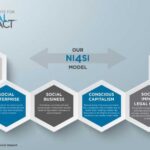Each month, I teach a portion of a Startup Day workshop. Jonathan Liebert, CEO of the National Institute for Social Impact, is the speaker who precedes my part of the presentation. He discusses the role of consumer activism and social impact related to businesses. He provides some excellent examples of companies like Patagonia and Bombas and how they achieved success by taking a stand on social issues. Being a good steward of the environment and providing socks for the homeless aren’t generally overly polarizing topics. Many people care about it, and few are vehemently against being environmentally conscious or helping the homeless by providing much-needed socks. However, some social issues are very polarizing. While taking a stand can have positive outcomes for a brand, it can also backfire.
Let’s face it: In today’s interconnected world, consumers have become increasingly conscious of the social and political impact of their purchasing decisions. It is no longer merely about the quality or price. Today, consumers consider a company’s stance on social issues to be a determining factor in their buying decisions.
Taking a stand on issues to which few are opposed can garner widespread support and minimal backlash. However, brands risk alienating one side or the other when they take a stand on polarizing issues with two opposing camps, exposing themselves to backlash and limited room for neutrality.
A company that publicly champions or supports local community projects, such as sponsoring youth sports programs or investing in neighborhood revitalization, are initiatives that generally have widespread community support. Moreover, a business that commits to environmentally friendly practices, such as reducing carbon emissions, implementing recycling programs, and sourcing materials ethically, are values that are widely supported. In these cases, the company that takes a stand on these types of issues is less likely to face significant opposition.
However, taking a stand on polarizing issues can have a very different outcome. A company that publicly advocates for stricter gun control measures attracts very strong support from gun control proponents, but also triggers vocal opposition from gun rights advocates, leading to intense debate and potential boycotts. Likewise, a business that takes a public stand in support of LGBTQ+ rights will receive staunch support from LGBTQ+ advocates and allies but will also face opposition from individuals or groups who hold conservative or traditional viewpoints, resulting in heated debates and potential backlash.
The polarizing nature of certain issues and the relative benignness of others can be attributed to several factors:
- Values and Beliefs: Polarizing issues often involve deeply rooted values, beliefs, and ideologies. They touch on topics that are closely tied to personal identity, morality, or worldviews. These issues can be emotionally charged, leading to strong convictions and a tendency for individuals to hold firm positions. In contrast, more benign issues may revolve around practical matters or preferences that do not challenge fundamental values or beliefs.
- Cultural and Social Context: Cultural, social, and historical factors influence the polarizing nature of certain issues. Topics related to religion, race, gender, or national identity, for instance, tend to evoke strong opinions due to their historical significance, societal norms, and ongoing debates. Benign issues, on the other hand, may relate to less controversial subjects like consumer preferences, lifestyle choices, or entertainment.
- Media and Public Discourse: How issues are framed and discussed in the media and public discourse can also contribute to their polarizing or benign nature. Sensationalized coverage, the amplification of extreme viewpoints, and the formation of echo chambers can exacerbate polarization. In contrast, issues that receive less media attention or are approached from diverse perspectives may be considered much more benign.
- Group Dynamics and Identity: Polarizing issues often lead to the formation of distinct groups with strong identities and a sense of “us versus them.” People tend to align themselves with like-minded individuals, reinforcing their beliefs and amplifying polarization. Benign issues, on the other hand, may not elicit the same strong sense of group identity or generate significant divisions between individuals.
- Legal and Ethical Considerations: Some issues are polarizing because they involve law, ethics, or human rights matters. Differing interpretations or competing interests can lead to intense debates and conflicting viewpoints. Benign issues, on the other hand, may not raise the same level of ethical or legal complexity and may be more amenable to compromise or agreement.
It’s important to note that the polarizing or benign nature of an issue can also be subjective and vary according to context and society. What may be polarizing in one region or community might be considered benign in another.
When It Might Make Sense to Take a Controversial Stand
So why do some companies choose to take a stand on a polarizing issue despite the risk of controversy and backlash? Here are a few considerations that might influence a company’s decision to take a stand.
- Alignment with Core Values: If the issue aligns closely with the company’s core values and purpose, taking a stand can demonstrate authenticity and reinforce the brand’s identity. Companies may see it as an opportunity to live up to their stated beliefs and make a positive impact in line with their mission.
In response to the 2017 refugee crisis, Airbnb launched its “Open Homes” initiative. The company pledged to provide temporary accommodation to those displaced by conflicts and natural disasters, regardless of their background or nationality. This initiative drew both praise and criticism for tackling the sensitive and polarizing topic of immigration.
- Appeal to Target Audience: Taking a stand on a polarizing issue can help attract and retain customers who share similar values and beliefs. By openly expressing a stance, companies can strengthen their connection with their target audience and build a loyal customer base that resonates with their values.
In 2017, TOMS shoes, known for its “One for One” business model, where they donate a pair to a child in need for every pair of shoes purchased, announced their support for DACA (Deferred Action for Childhood Arrivals). This program protects undocumented immigrants who arrived in the US as children. This stance appealed to their core target audience of socially conscious consumers who value inclusion and support for immigrant rights. Their support for DACA resonated strongly with their target audience, leading to increased brand loyalty and support from customers who shared their compassion and social justice values.
- Differentiation and Competitive Advantage: Taking a stand can help companies stand out from their competitors in crowded markets. By embracing a polarizing issue, a company can differentiate itself and appeal to a specific market segment that aligns with its stance. This can provide a competitive advantage and attract customers who appreciate the company’s boldness.
The fast-food chain Chick-fil-A is known for its Christian values and has taken a stance against same-sex marriage due to its founder’s religious beliefs. Despite facing backlash and calls for boycotts from those who disagreed with their stance, Chick-fil-A maintained its position. Their stand has reinforced its brand identity and fostered loyalty among customers who appreciate its alignment with its core values. It has effectively differentiated itself in the very competitive Quick Service Restaurant (QSR) market.
- Social Responsibility and Impact: Companies may feel a moral obligation to address certain social issues, even if they are polarizing. They might view taking a stand as an opportunity to use their platform and influence for the greater good, even if it means risking controversy. This approach reflects a commitment to corporate social responsibility and an active role in driving positive change.
In 2020, amidst the nationwide protests against racial injustice following the death of George Floyd, Microsoft CEO Satya Nadella issued a statement expressing support for the Black Lives Matter movement. Despite potential backlash or disagreement from certain individuals or groups, Microsoft stood firm in its moral obligation to stand up against racial injustice and work towards a more inclusive society.
- Employee Engagement and Morale: Taking a stand on a polarizing issue can also impact internal stakeholders, such as employees. By aligning with their values and addressing societal concerns, companies can foster a sense of pride, purpose, and engagement among their workforce. This, in turn, can contribute to a positive work culture and attract and retain talented employees who share the company’s values.
In 2015, Salesforce publicly announced its commitment to gender equality by conducting a comprehensive review of its employee compensation and making necessary adjustments to ensure equal pay for equal work. This bold stance resonated strongly with Salesforce employees, particularly women who felt supported and valued within the organization. The company’s commitment to gender equality not only boosted employee morale but it attracted top talent, making recruitment easier as individuals seeking an inclusive and equitable work environment were drawn to the company.
Free Earned Media Coverage
When a company takes a stand on a polarizing issue, it can generate significant earned media coverage and attention, increasing its visibility and amplifying its message. This heightened exposure can enhance the company’s reputation and brand image, positioning it as an authentic and socially responsible entity. By aligning with their core values or appealing to their target audience, companies can foster positive customer perception and loyalty, as consumers who share similar beliefs and values are more likely to support and advocate for the brand.
In 2018, Nike launched a marketing campaign featuring Colin Kaepernick, a former NFL player known for kneeling during the national anthem to protest racial injustice and police brutality. The campaign’s slogan “Believe in something. Even if it means sacrificing everything” ignited a firestorm of public debate and media coverage. The move generated positive Public Relations (PR) for the company, attracting new customers who admired Nike’s bold stance and alignment with their values.
However, the campaign also faced significant backlash from individuals and groups who perceived Kaepernick’s protest as disrespectful to the flag and the military. The controversy led to a dip in Nike’s stock price, impacting the company’s financial performance. The controversy even spread to the NFL, making headlines as the league faced intense debate over player protests during the national anthem. The media coverage and public attention generated a significant amount of buzz, reinforcing Nike’s reputation as a company willing to take a stand on controversial social issues. The Nike example highlights the dual nature of controversial stands, with the potential for both positive and negative PR outcomes.
The Downside Risk of Taking a Stand
It’s important to note that taking a stand carries the risk of backlash, boycotts, and negative publicity, which can lead to divisiveness and controversy. Companies should consider potential reputational risks carefully and ensure their stance is well-aligned with their values and supported by thoughtful communication strategies to mitigate negative PR effects.
By aligning with one side, businesses risk alienating a significant portion of their customer base, potentially leading to boycotts and negative publicity. When companies become embroiled in divisive debates, focus can shift away from their products or services, potentially damaging their reputation and bottom line.
While taking a stand can be seen as a positive step, some companies may use it as a mere marketing strategy without genuinely committing to social change. This practice, known as greenwashing, can erode consumer trust and backfire, leading to accusations of insincerity. Consumers are becoming increasingly discerning and can easily see through inauthentic attempts to exploit social issues for financial gain.
Addressing social issues is complex, and companies may struggle to navigate the diverse range of perspectives. What might seem like a clear-cut moral stance to some may be a more nuanced and challenging issue for others. Moreover, businesses must balance social responsibility with the demands of profitability, shareholder interests, and legal constraints. Taking a stand on every issue may not be practical or feasible for every company.
An example of a business that took a stand on a polarizing issue that backfired on them was the Bud Light ad featuring Dylan Mulvaney.
Bud Light is a popular American beer brand that has been associated with sports, parties, and masculinity for decades. Dylan Mulvaney, a transgender woman who is a social media influencer and advocate for LGBTQ+ rights, was featured in a Bud Light ad. The April 2023 ad campaign was intended to show Bud Light’s support for diversity and inclusion and to appeal to a younger and more progressive audience.
However, the campaign backfired as a large majority of Bud Light customers, especially those who identify as conservative and more traditional, felt alienated and offended by the company’s endorsement of a transgender person. They accused Bud Light of being “woke,” “anti-American,” and “betraying” their loyal fan base.
Moreover, the LGBTQ+ community felt that the brand’s support of Dylan was inauthentic because Bud Light did not defend her adequately and was not more vocal in supporting the community amidst the negative publicity. Instead, Bud Light quickly pivoted to a male-focused tack in its advertising strategy, rolling out a new ad featuring Kansas City Chiefs tight end, Travis Kelce.
The backlash led to a boycott of Bud Light products, with some customers destroying or returning the cans in protest. Bud Light sales dropped significantly due to the controversy, and some stores stopped carrying the Pride-themed cans. The controversy exposed the deep divide between Bud Light’s traditional and progressive customers, as well as the company’s challenges in balancing its brand image and values.
Another example of a business that took a stand on a polarizing issue that backfired on them was Gillette and their “The Best Men Can Be” ad campaign in 2019.
Gillette, a renowned razor and personal care products brand, released a short film as part of a campaign challenging toxic masculinity and urging men to reflect on their behavior. The ad addressed bullying, sexual harassment, and gender stereotypes, encouraging positive change and redefining what it means to be a man.
However, the campaign faced intense backlash from some of its customer base and pundits who argued that Gillette was engaging in virtue signaling, attacking men as a whole, and attempting to dictate societal values. Some perceived the ad’s messaging as condescending and an indictment of masculinity in general, leading to widespread criticism and calls for a boycott.
Critics accused Gillette of inauthentically capitalizing on a societal movement for their own financial gain. They argued that the brand was exploiting social issues without genuine commitment and that the ad failed to resonate with its core customer base. Media outlets and social media discussions amplified the negative perception of the campaign, leading to a significant backlash against the brand.
The controversy resulted in a mixed outcome for Gillette. While the ad received praise and support from those who appreciated the message, the negative publicity and backlash from detractors created a highly polarized environment. Some consumers expressed disappointment and vowed to switch to competing brands, while others applauded the campaign and commended Gillette for addressing important social issues.
The Bud Light and Gillette examples demonstrate the potential risks businesses face when taking a public stance on complex social issues. Inauthenticity and a lack of understanding or consideration for consumer perspectives can lead to divisiveness, negative publicity, and potential alienation of customers. It underscores the importance of businesses being authentic, thoughtful, and understanding of the diverse viewpoints of their customer base when engaging in social issue campaigns to avoid unintended consequences and backlash.
Conclusion
Taking a stand on social issues can be a double-edged sword for businesses. While it offers the potential for increased customer loyalty, positive brand image, and societal impact, it also presents risks such as alienating customers and accusations of inauthenticity. To mitigate these challenges, companies must be thoughtful, genuine, and consistent in their approach. Transparency, authenticity, and alignment with issues that genuinely resonate with their core values can help businesses navigate the intricacies of consumer activism successfully.
Is the reward for taking a stand on a polarizing issue worth the risk?












